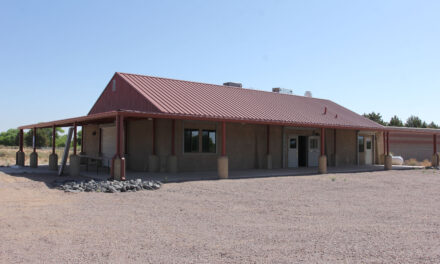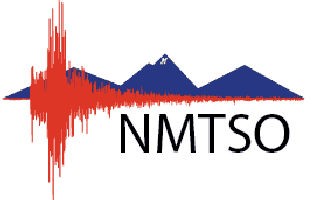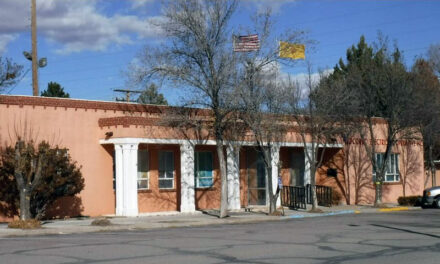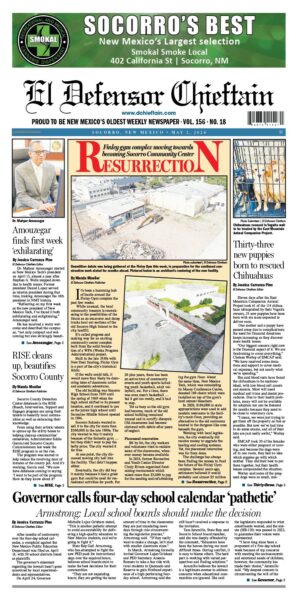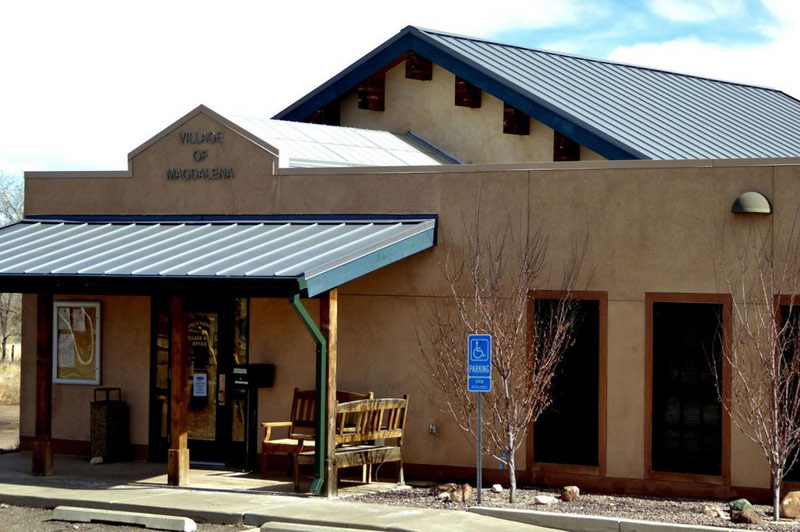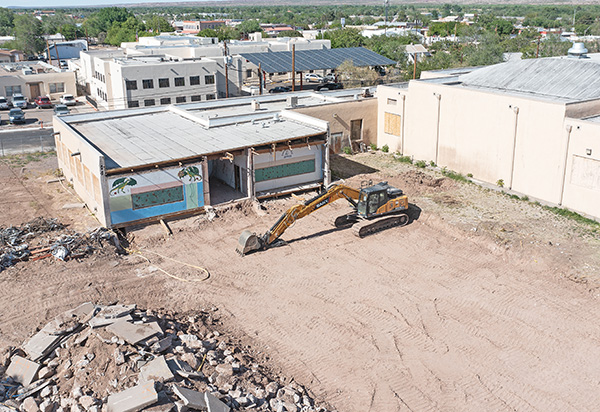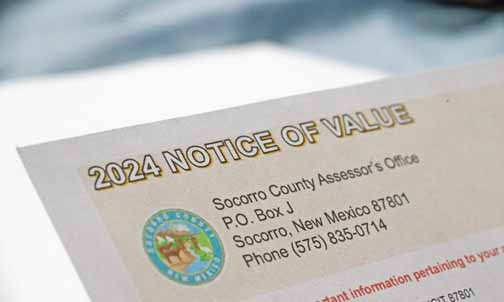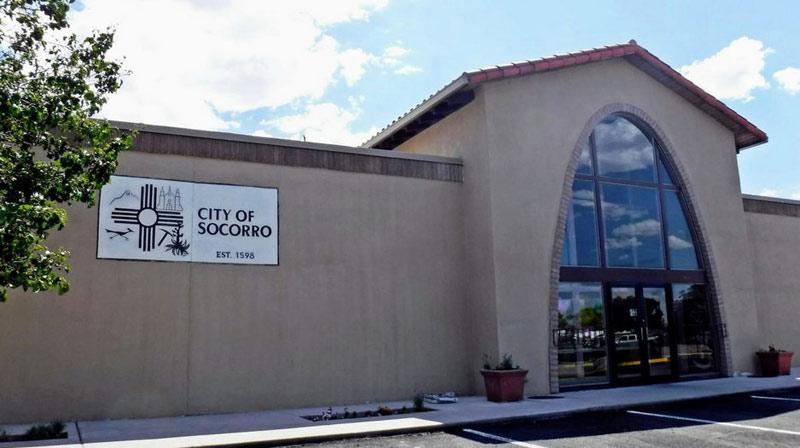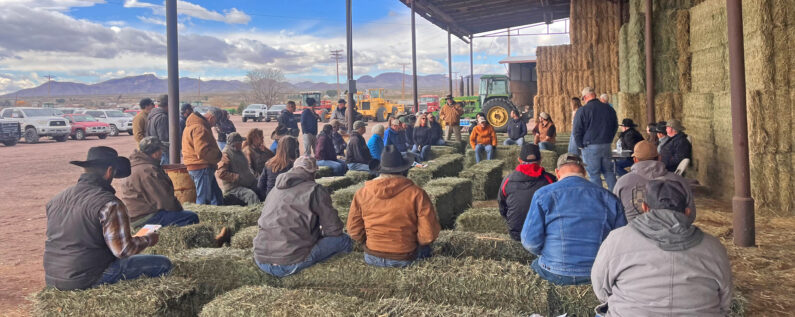
Jessica Carranza Pino| El Defensor Chieftain
Farmers and irrigators in Socorro County attended the Middle Rio Grande Conservancy District informational meeting at the Harris Ranch in San Antonio.
A controversial insurance issue received the attention of area farmers during a recent Middle Rio Grande Conservancy District (MRGCD) last week.
MRGCD conducted an informational meeting with Socorro farmers and irrigators on Nov. 30 at the Harris Ranch in San Antonio. About forty farmers and irrigators were in attendance.
MRGCD Chief Engineer/CEO Jason Casuga facilitated the meeting with comments and information from staff, along with board members Glen Duggins, Stephanie Russo Baca, Brian Jiron and John P. Kelly.
Discussions included a 2023 irrigation recap, expectations for 2024, new technology, and a controversial insurance issue.
In his recap of the irrigating season, Casuga said that 2023 was “almost the complete opposite of 2022.”
“In 2022, we had almost no spring runoff or robust monsoon season, and we didn’t have critical pieces of infrastructure to guide us through the ups and downs. What I mean by that is we didn’t have El Vado,” Casuga said. “Then we moved into 2023 and had the complete opposite of that: a very robust Spring runoff – one of the best ones we’ve had in about four or five years. But then we have almost negligible amounts of quantifiable rain, making the season’s back end very difficult.”
Compounding the issue is that, due to a Bureau of Reclamation rehab project at its dam, El Vado Reservoir will be unavailable for water storage through at least 2026. Casuga said he didn’t know if they would have partial storage available in 2026 or not but that they would hope to know after the December board meeting.
Water Ops Division Manager Ann Marken explained that they could only use the San Juan Chama since El Vado wasn’t available.
“We were only able to access the San Juan Chama water, which we had to use much sooner and quicker than anticipated,” Marken said. “We started using it in July and it was exhausted by the end of August. After that, we were at the mercy of what the river was providing.”
Marken emphasized that this year was a good example of the importance of water storage.
Bernalillo’s board member, Kelly, offered his synopsis of what they could expect.
“In the next couple of years, we are going to be a run-of-the-river irrigation district with 20,000 acre-feet of water coming in from the San Juan Chama, and things aren’t looking much better,” Kelly said. “I am going to raise holy hell with the Bureau of Reclamation of what’s going on at El Vado Dam.”
He said that they tried to use the wrong gravel for the dam and it “ran everywhere.”
Casuga announced that MRGCD now would issue an operating elevation for checks in Socorro as requested by their insurance. A couple of attendees spoke out against the request.
“Historically, our checks down here have had wood boards put in them to modify the historical and original engineering drawings, and adjust water surface elevations to be higher, and I know that results in more efficient irrigation,” Casuga said. “But now, from an insurance standpoint, I have to issue a new water surface elevation they can safely operate at.”
He said it would be done through conversations with MRGCD and working with the Irrigation System Operator, commonly known as the ditch rider.
“What you’re saying is ticking off a lot of people here,” said Steven Sichler of Snake Ranch Farms. “Why are you allowing the insurance to dictate how we operate our system? Our system has worked well for a long time.”
Casuga then put it bluntly.
“I’m not the one who filed the claim against the district that brought the insurance company here,” he said. “Check boards were raised. Something happened on the ditch bank, and a claim for not an insignificant amount of money was filed against the district because of the practice down here.”
“I didn’t necessarily want to say it like that, but it happened,” Casuga said. “That’s the only reason the insurance company is involved.”
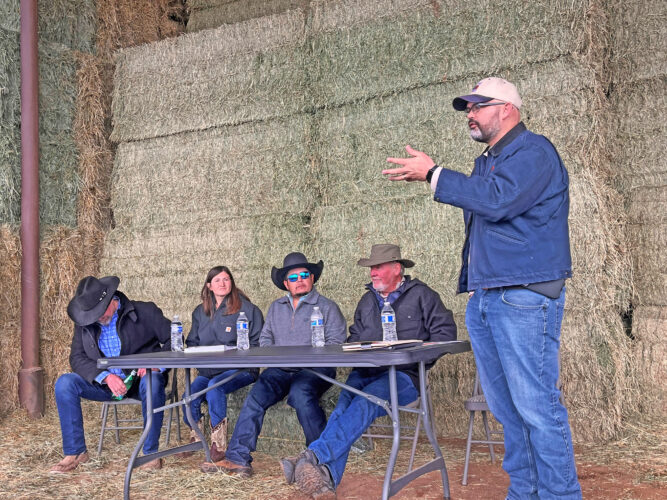
Jason Casuga, Chief Engineer/CEO of MRGCD lead the meeting with contributions from board members and staff.
MRGCD’s Socorro Division Manager, Julian Avalos, said in an interview after the meeting that this informational meeting came up because of the lawsuit.
“It just took one farmer,” Avalos said. “We broke a ditch and had a lawsuit against us because of the boards on the check structure, and that created a snowball effect down in San Antonio.”
The meeting included an update on the Fallow Program, which allows landowners to lease water back to the district. This year, the per-acre payment was increased from $200 for partial season to $400 and $350 for full season to $700.
The goal of the program is to reduce overall water demand, increase the flexibility of the MRGCD’s water resources, and help balance multiple water management objectives. Participants can irrigate lands under normal district water service contract conditions as soon as the lease ends.
Regarding new technology, Casuga said they’ve been working on a system called True Canal to monitor irrigation requests and statistics better. The idea is to have a database of maps available for anyone to see where and what gets water. Then, Casuga said, they could tie checks and turnouts to properties and see what and how they serve, leading them to a system that will give real-time access to requests and services to hold the MRGCD staff accountable.
Another benefit, according to Casuga, is that the data that they will be able to collect will help defend farmers and their water use.
“The goal is to pilot that program in Socorro in irrigation season 2025,” Casuga said. “We are rolling it out small.”
In the meantime, he said they will start to implement the use of the property irrigation ID number. Every property has a number, and they will be able to assign multiple irrigation IDs to one piece with multiple borders and various schedules.
Casuga said Socorro moved from paper logs to using tablets last year.
“It’s very user-friendly,” Avalos said of the move to tablet use. “It keeps our farmers honest and our conservation honest as well. It holds to accountability.”
Farmer advisory committee
An effort to enforce rules was brought up, which attendees favored. The board announced they would like to develop a farmer advisory committee composed of irrigators and farmers. Two appointed farmers from each county would have regular meetings, help with policy and provide feedback for rule enforcement.
According to Casuga, he considered Socorro farmers and MRGCD staff as being an example for other areas to follow. The local division manager agreed.
“At the end of day, they all work really well together as a team,” said Avalos.
Columnist John Larson contributed to this story.




